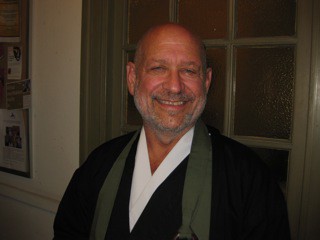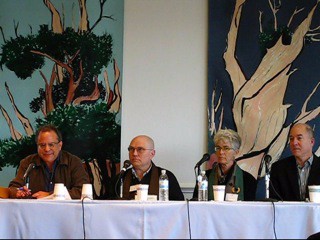news
DOGEN: LOST & FOUND IN TRANSLATION

Zen Lunch (L) and Buddha (R)


“Each moment is all being, each moment is the entire world.” — Dogen
From the rebel-yelling Beats of North Beach back alleys to the debauched Lit Crawlers in the bars, bookstores and sex shops of the Mission, San Francisco’s literary wild side is widely recognized by book fetishists across the nation. Perhaps lesser known, though no less a cultural institution, is the San Francisco Zen Center, a Hayes Valley neighborhood hub for the city’s dynamic Buddhist community. Founded in 1962 by the late Japanese expat Shunryu Suzuki, a beloved teacher whose primer “Zen Mind, Beginner’s Mind” has served as a beacon toward mindfulness for millions of readers worldwide, the SFZC has long sponsored the creation of new literature and modern translations of signficant texts of the past. The organization’s latest endorsement, “Dogen: Treasury of the True Dharma Eye,” is a complete, two-volume, English interpretation of Soto Zen founder Eihei Dogen’s “Shobo Genzo,” a 1000-page collection of dharma (truth) talks — including essays, stories, poems and provocative linguistic and philosophical puzzles — written nearly 800 years ago. On Saturday, a dozen or so authors and speakers gathered at the Zen Center and Fort Mason to celebrate the release of this monumental project. The takeaway? Dogen’s message of mindfulness, acceptance and action is still resonant in 2010 and of particular value to writers.
Poet Peter Levitt (L) and Artist Kazuaki Tanahashi (R)


Introducing the book’s associate editor, poet Peter Levitt, Zen Center abbot Ryushin Paul Haller remarked how both the project and zazen (mindfulness meditation: the foundation of Zen practice) are about “doing the impossible and discovering that the merely difficult is not such a challenge.” The concept of making the impossible possible is the ethos of the project’s editor, artist Kazuaki Tanahashi, who dedicated the past 50 years of his life to translating Dogen, first from medieval to modern Japanese and then, with the support of the SFZC for more than three decades, into English. Tanahashi’s principal partner, Levitt, confessed at the start of his dharma talk: “If we knew what we were doing, we probably never would have started.”
The inside joke is, of course, they knew. Dogen’s got a rep for being one of the thorniest deep thinkers of all-time. His ideas — progressive to this day on issues of language, community and gender relations (not to mention living and breathing and embracing, as Dogen heir Suzuki put it, “things as it is”) — are so layered with nuance, ambiguity and complex paradoxes, it’s assumed that most of his monastic students (from 1233 until his death in 1253) never understood him. And yet, his words live on.
Levitt broke it down like this: According to Dogen, “the world is the function of intimacy, which is way beyond being close. Intimacy is thoroughness, completeness, being drenched [in everything], all-inclusiveness. There’s no gap” between anything, ever. You and the person next to you on the subway, the mountains and the sea, an incipient story and the blank page are all one. He argued that when we understand life moving together in this way, then we feel the warmth of all creation because everything is more than just part of us: it is us. No gap. No separation. He said we must be courageous “to come closer. Don’t let anything stop you from going all the way… to know the world on its own terms.”
For writers, this is especially poignant. “To come into language,” Levitt said, “we have to go outside of language, to be intimate with the world.” How else will our writing be truthful unless we acknowledge — then engage — with the world as it is?
For Dogen, the world is mind. “Not my mind or your mind,” as Levitt put it. “Just mind.” Mind is the world. So if we can realize this — embody this — then our words will not only reflect the world but be the world as it is. Levitt said, “Never forget the place from where the words come out from.” He emphasized the two froms in this phrase to convey the concept of source, the springboard of mind, world, word. One and the same. No gap.
Tanahashi suggested that we consider this no-gap way of interacting when confronted with “violence and divisions. We face impossibilities,” he said, “which might make us feel helpless or feel like not engaging.” But, he argued, “Dogen believed in the power of action, however small,” and in the certainty of the ripple effect of mindfulness as we intimately move through the world. The point? In Dogenspeak: to go beyond, to actualize buddha (enlightened) nature, to be “buddha-going-beyond-buddha,” and in so doing, to uplift yourself and the world around you.
Steven Heine, Taigen Dan Leighton, Susan Moon, William Bodiford (L) and Jeff Bickner, a teacher at Everyday Zen (R)


In a panel discussion, “Visions of Awakening Space & Time” author, Taigen Dan Leighton, reiterated the point above, explaining how translations of Dogen’s texts are crucial as “an ongoing awakening of buddha-beyond-buddha.” If we acknowledge that “there’s always more” to what we initially tend to perceive (and settle for or attached to), then we can know “the mountains and ancestors are a single line,” one all-encompassing unbroken lineage, from which we can derive boundless joy (aka enlightenment).
German medical doctor Friederike Boissevain presented her understanding of Dogen within the powerful context of healing. She said, “Opening is healing… starting anew is healing… trusting yourself is healing… never looking back is healing… not knowing is healing… asking questions again and again is healing… healing is now… healing is forgiving… healing is always possible.” Her courageous, compassionate aphorisms struck a chord: How many writers are often compelled to put words on the page from a place of pain? How many struggle with their own insecurities regardless of external validation? How many are healed through the creative process, by immersion in the moment, by making the impossible possible?
Author Brad Warner (L) and Composer Masayuki Koga (R)


“Hardcore Zen” author, Brad Warner, brought a fresh perspective to Dogen by connecting the “intensely moral” ethos of early ’80s punk rock — “trying to find something deeper than conventional social morality” — with Zen, which he first encountered as a young punk in college and recognized right away as “the most punk rock thing I’d ever come across.” Echoing the classic argument against the MFA Literati, he said it’s “important to take Buddhist studies out of academic scholarship” and away from “Buddhist nerddom” to get the ideas into popular culture. For better or worse, this has already been happening via commercial appropriations in the guise of the Dogen character on the TV show “Lost,” the Zen Republic Energy Drink and the Buddha Bar. Blasphemous? Perhaps. But Warner sees these unusual rip-offs with an open heart, calling for less rigidity (non-attachment) by Zen purists and more faith (acceptance) in the ability of future generations to understand Dogen in ways the ancestors could never have imagined.
There’s a lesson in this for all of us: let go of preconceptions, trust in not-knowing, welcome everyone and everything, and finally, convey the dharma (make possible the impossible) in a language that speaks directly from one mind.
— Jesús Ángel García is the author of “badbadbad,” a transmedia novel about the perils of living in an e-world with eyes wide shut. Print publication (on New Pulp Press) is set for May 2011. Previews of the 3xbad text, soundtrack and film are available on http://badbadbad.net.









